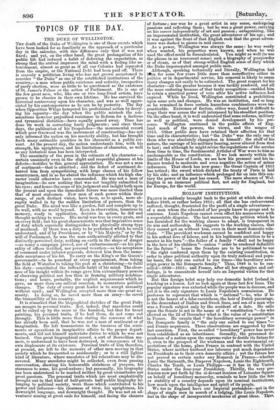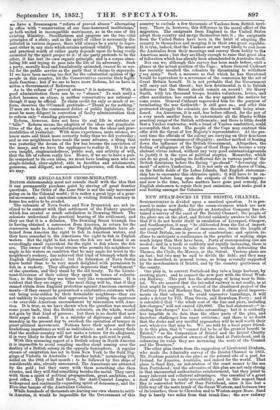HOLLOW INSTITUTIONS.
FRANCE is suddenly brought back to the point at which she stood before 1848, or rather before 1815; all that she has endeavoured suffered, thought, frustrated for the profit of a single adventurer— of a man whom the educated of her people know to gauge and to contemn. Louis Napoleon cannot even effect his manceuvres with a respectable disguise. The last manoeuvre, the petition which he has furnished for the working classes to adopt, is transparent in its aim and authorship. He suggests to the working classes, that they cannot get on without him, even in their most domestic rela- tions. "The provident workman cannot be confident and happy in his ardent love of labour, and in his legitimate ambition to be a master in his turn "—the father of a family "shall not be happy in the love of his children "—unless "order be rendered definitive for the future " : hence the Senators are to be petitioned to use "the right conferred upon them by the existing constitution, in order to place political authority upon its truly national and popu- lar basis, the only one suited to our times—the hereditary sove- reign power in the Bonaparte family." Thus, 1848 is to be can- celled-1830-1815 ; and France, after all her struggles and suf- ferings, is to concentrate herself into an Imperial victim for that single adventurer.
But this foreign helot may help our domestic helot Ireland in
teaching us a lesson. Let us look again at those last few lines. The popular signature was extorted while the people was in duresse, and yet it is the only signature to Louis Napoleon's commission. He professes to represent that which is "national"—he, who if he is not the bearer of a false escutcheon, the heir of Dutch parentage, is the descendant of Italian and Greek lines' and son of a man who was a French subject only by the accident of a date. He calls upon the Senate to act in the name of a "constitution "—he who showed on the 2d of December what is the value of a constitution in France. He vaunts that "the hereditary sovereign power" in the Bonaparte family is "the only one suited to our times "- and France acquiesces. Three observations are suggested by this last assertion. First, the so-called "hereditary" power has never been established as an inheritance. Secondly, the presumed de- pendence of a nation upon the supreme ruler to decide its future for it, even to the prospect of the workman and the matrimonial ex- pectations of the home, place France in contrast with the 'United States, where neither husband nor labourer put much dependence on Presidents as to their own domestic affairs ; yet the future has not .proved so certain under any Monarch in France—whether Louis the Sixteenth, the Emperor Napoleon, Louis the Eighteenth, Charles the Tenth, or Louis Philippe—as it has in the United States unsler the four-year Presidency. Thirdly, the very pre- tension now put forth by the ci-devant denizen of Leicester Square on behalf of hereditary monarchy, reminds us how little the fate or stability of a country depends upon its nominal institutions, how much upon the intelligence and spirit of its people.
We too in England have our Imperial pretenders—not in the shape of single men in search of a lodging, like Louis Napoleon, i but n the shape of incorporated mockeries of great ideas. Thus, we have a Brummagem "reform of proved abuses" alternating in office with "conservation of our time-honoured institutions," or both united in incompatible matrimony, as in the case of the existing Ministry. Steadfastness and progress are the two vital principles of a state ; and as the spirit of either is necessarily dis- tributed in various degrees, there will always be a party to repre- sent either in any state which retains national vitality. The moral and practical worth of either party depends upon its being really animated by the spirit proper to it : if one party pretends to be the other, it has lost its own organic principle, and is a corpse simu- lating life and trying to pass into the life of its adversary. Such a party, morally dead and fraudulently animated, cannot be so use- ful for the public service as the party that it claims to supersede. If we have been moving too fast for the substantial opinion of tip people in this country, let the Conservatives exercise their legiti- mate function ; but if we are to have more Reform, let us have in action a Government of Reformers.
As to the reform of "proved abuses," it is nonsense. With a good administration there can be no "abuses." To wait until a defect becomes an abuse, is neither conservative nor rational— though it may be official. To claim credit for only so much of re- form, deserves the O'Connell gratitude—" Thank ye for nothing." If men are to do the commonest duties of public legislators, they must be more diligent in correction of faulty administration than to reform only "standing grievances."
Reform' however, does not have its real life in statutes or "bills." Reform means the adoption of the ideas and practicabi- lities of the day, as contradistinguished from the ideas and prac- ticabilities of yesterday. With more experience, more science, we know more and think more correctly today than we did yesterday; and as our neighbours have made the same advance a thing that was yesterday, the dream of the few has become the conviction of the many, and we have the appliances to realize it. It is in our own insight, singlemindedness, public zeal, and activity of will, that the life of reform really lies. Hence, if we are to have a pub- lic competent to its own ideas, we must have leading men who are single-minded, clear-sighted, able in faculties and attainments, generous, and diligent, not organized hypocrisies, call them what we may.



























 Previous page
Previous page